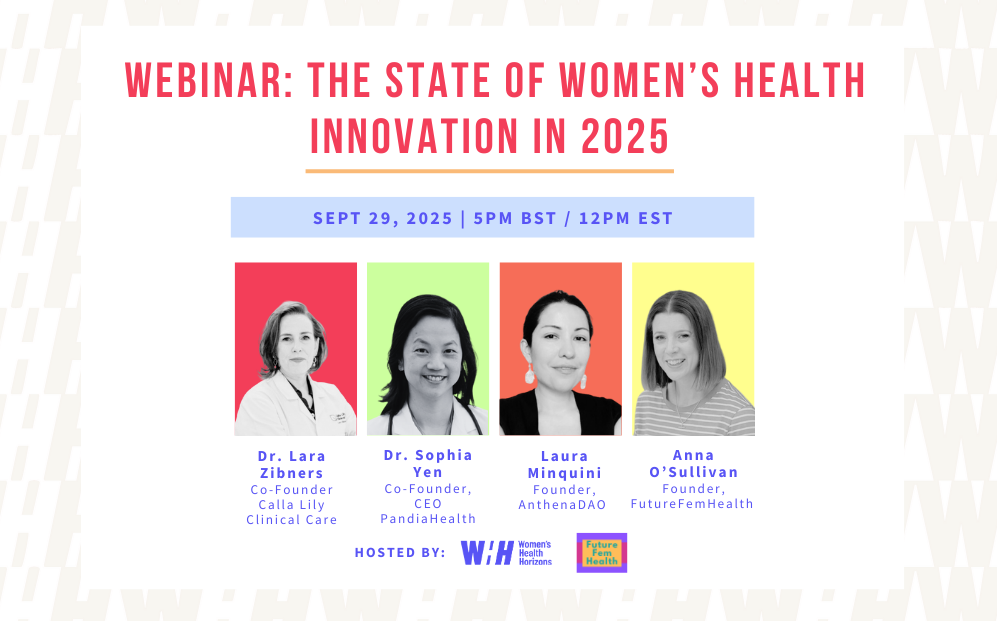💌 Issue 115: Calls for EU women's health strategy | Mercy Bioanalytics $59m boost for ovarian cancer | why are women tracking health?
The global weekly briefing on women's health innovation and FemTech
Welcome to issue 115 of FutureFemHealth, (w/c September 22 2025) — we’re trusted by 8,500 investors, innovators and leaders to decode the funding flows, breakthrough ideas and policy shifts transforming the sector.
🌟 In this week’s briefing:
🌎 Why Europe urgently needs an EU-wide women’s health strategy
💰 Earlier detection for ovarian cancer: Mercy Bioanalytics raises $59m Series B
❤️ Seven Starling raises $8m to expand access to maternal mental health support.
📈 The rethink on why women track their health metrics
Got news to share from the world of FemTech and women’s health innovation? Let me know at anna@futurefemhealth.com
📆 Save the date…
What are the key trends and pain points in women's health innovation right now? Where is the future taking us?
To set the stage for the Women’s Health Horizons (WHH) inaugural event in Boston, I’m pleased to share that FutureFemHealth will be co-hosting a webinar on Sept. 29 to explore exactly these topics!
Panelists include:
Dr Lara Zibners, Co-Founder, Calla Lily Clinical Care
Dr Sophia Yen, Co-Founder, CEO, Pandia Health
Laura Minquini, Founder of AthenaDAO and AthenaBIO
Anna O'Sullivan, Founder of FutureFemHealth
Moderated by Ashleigh Niziol of Women’s Health Horizons (WHH), expect a 45 minute live chat with special guests, with plenty of time for questions.
Topics we'll cover:
🟢 Alternative investments streams in women's health
🟢 Why women's health is not just fertility and how we need to focus outside of bikini medicine
🟢 The nuanced rise of menopause and longevity
🟢 Responsible use of women's health data
🟢 Censorship in women’s health as an ongoing systemic barrier for many startups and innovators
👉 Register today here: https://luma.com/i0a9c40k
🗓️ Sept. 29, 2025 - 5pm BST / 9am PDT / 12pm EST
🌎 Why Europe desperately needs a women’s health strategy

While Europe is one of the largest health markets in the world it is also very fragmented. Different national strategies and regulations can mean silos that slow progress and make scaling innovation unnecessarily difficult.
In women’s health, national strategies in Ireland, Austria, and the Netherlands are promising. And initiatives such as the FemTech France dedicated investment fund show progress. At an EU-level, the European Commission has also invested over €2 billion in more than 1,000 research and innovation projects.
But there is so much more to do.
This week, the independent think tank the European Policy Centre (EPC) has issued an urgent call: the EU needs a dedicated Women’s Health Strategy before 2029.
Its new report ‘Accelerating women’s health’ sets out the persistent gaps — from underrepresentation in clinical trials to underfunding of research, delayed diagnoses, and stigma around issues like menopause.
Without EU-level coordination, it says the same problems will persist for another decade or more.
Interestingly (but not surprisingly) the EPC’s recommendations are priorities that keep surfacing in other reports globally. They include mainstreaming women’s health into legislation and funding, mandating sex-disaggregated data in trials, setting up an expert group to guide research, and putting inclusive digital health at the centre.
As Anastasiya Markvarde, a women’s health and innovation expert from Finland and author of Women’s Health Digest, explained to me:
“The EU strategy would stimulate the member states to act accordingly, and would of course promote the exchange of best practices between the countries, making us stronger as a region.”
In short, an EU-wide strategy would provide a ‘scaffold’ of sorts for Europe to overcome silos, harmonise standards and speed up progress across the single market.
The EPC report concludes that the EU has both the evidence and the tools to act. Now it just needs the appetite too.
Continue reading our full story here.
💰 Capital flows: where are investors placing bets?
📌 U.S: Mercy Bioanalytics raises $59m Series B to advance early ovarian cancer detection. Ovarian cancer remains one of the most lethal cancers for women, largely because it is often diagnosed late. Mercy BioAnalytics is developing liquid biopsies to catch cancers earlier, at more treatable stages. And with this huge funding round the start-up plans to speed up commercialization of its ovarian cancer screening portfolio. "We believe Mercy is building one of the most promising early detection platforms in oncology," said Paul Meister, Partner at Novalis LifeSciences which co-led the round alongside Sozo Ventures. (Continue reading: FutureFemHealth)
📌 U.S: Seven Starling raises $8m to expand access to maternal mental health support. One in five women face perinatal mood and anxiety disorders, yet most never get care. Seven Starling’s hybrid model - OBGYN referrals, specialized therapy, group sessions, and in-app tools - is changing that. With $8M in new funding led by Rethink Impact, the startup plans to reach 30+ states by 2026, scaling from 18 to date and 1,500 OBGYN partners. Its results so far are striking: 90% of patients see clinical improvement, most pay $0–30 with insurance, and nearly 40% are BIPOC. “Maternal mental health represents a massive market failure – high costs, poor outcomes, and critically underserved populations – and is ripe for disruption,” said Jenny Abramson, founder and managing partner of Rethink Impact. (Continue reading: MedCity News)
This week’s poll
Last week’s poll asked ‘what excites you most about women’s health right now?’. Decisively, 50% of you said it was closing the gender research gap. Next up was biomarkers and diagnostics with 19%, AI was next at 17% and wearables at just 8%.
👩🏽💻 Do you have a juicy question we could ask our readers? Let me know at anna@futurefemhealth.com!
🌟 Industry moves and strategic shifts
📌 FINLAND: Oura ring maker to become $11 billion company with latest raise. Bloomberg is reporting that Oura Health is set to close a massive $875million+ funding round to scale production, invest in development and expand internationally. But to me, the real story here is that women’s health has been the engine of its success: the majority of Oura’s users are women and Oura has built deep integrations into Clue, Natural Cycles, Progyny, Maven and more. Proof that women’s health can power multi-billion-dollar businesses. (Continue reading: Reuters)
📌 U.S: Virtual menopause care provider Elektra Health adds payer partners in N.Y. Elektra now claims to be more accessible than any other virtual menopause provider - covering more than 95% of women in New York State. It’s added MetroPlus Health and Fidelis Care to its payer partners in the region. “Every year in New York City, thousands of women enter menopause. Yet many women with symptoms go undiagnosed, and many wait over a year before their transition is even acknowledged by a provider. We see this gap clearly within our member population, and we’re committed to closing it.” (Continue reading: Fierce Healthcare)
🩸 Research and women’s health news

📌 U.S: The pleasure principle in women’s health. New research from Snatch Health found that over two-thirds of women (67%) now track their health to push performance - not for symptom-tracking or to fix problems as you might assume. These are the women aspiring to live longer, feel stronger and have a more vibrant life. The study points to a “performance trifecta” of sport, sleep and sexual wellness, and heard 73% of women call for more integrated platforms to support them. Another clear signal that health optimization and longevity is hitting the women’s health mainstream. (Continue reading: Snatch Health)
📌 GLOBAL: How AI could transform women’s health. There’s headlines aplenty about AI bias. But this piece from the World Economic Forum highlights its potential to reduce data deserts, bias and gaps. The caveat of course is that meaningful progress relies on analysing data through a sex-specific lens to reduce inequalities rather than reinforcing them. (Continue reading: World Economic Forum)
📌 AUSTRALIA: This new AI tool can predict women’s heart health risks with mammograms. Developed using data from over 49,000 women, this approach avoids the need for separate cardiac examinations and holds promise for countries where mammogram take-up is high but where screening for heart disease is not standard. The study was published in the journal Heart. (Continue reading: Euro News)
📌 GLOBAL: A new study suggests these types of heart attacks are most common in younger women. A new study found that over half of heart attacks in women under 65 aren’t caused by clogged arteries - which is the most common cause in men. Instead, they stem from overlooked causes like embolism, vasospasm or spontaneous coronary artery dissection (SCAD). As a result, women experience a lot of misdiagnoses when it comes to heart health, particularly since they might present with ‘atypical’ symptoms. The study highlights the needs for differentiated research, education and care. (Continue reading: Women’s Health)
📌 US: Indiana launches women’s sports science initiative. Despite record-breaking participation and revenue growth, sports medicine still treats female athletes based on what we know from men. Indiana University, with partners including Pacers Sports & Entertainment, is launching the Female Sports Performance and Research Initiative to change that. The bigger story here is that initiatives like this are worth tracking - by building a research base around female athletes they close knowledge gaps not only in sport but in women’s health more broadly. (Continue reading: News at IU)
📄 Policy watch: risks and opportunities
📌 U.S: State abortion bans are creating a doctor shortage. Abortion bans in states like Idaho, Mississippi, and Oklahoma have been reshaping reproductive rights — but now they’re hollowing out the medical workforce too. Established physicians are relocating, medical students are opting out, and OB-GYN training is being stripped from classrooms and hospitals. The fallout impacts abortion care - but this is also a generational hit to healthcare access, with fewer providers to handle everything from prenatal care to high-risk deliveries. The shortage today sets up a public health crisis for decades. (Continue reading: Time)
That’s all for this week! If you’ve missed any previous newsletter issues catch them all at futurefemhealth.com and do make sure to follow us on LinkedIn.
Anna
PS. FutureFemHealth reaches 8,500 decision-makers and professionals in women’s health each week - from investors and founders to healthcare leaders and corporates. To explore partnership opportunities or request our media pack contact: anna@futurefemhealth.com







YES to a women's health strategy!
These metrics are exciting! We at Asterisk built the first women’s non-reproductive health tracking app.